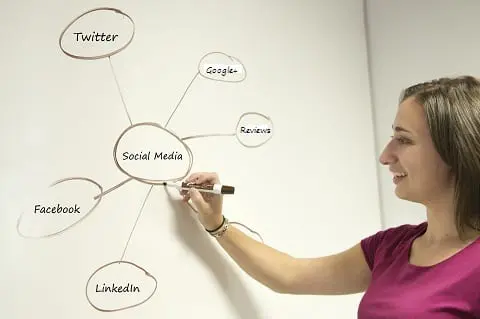
Unless you’re super tech savvy, you may be apprehensive about how to use social media to market your business and engage with clients.
Realtors maintain busy schedules as it is, so making Facebook posts or updating a blog usually aren’t high priorities.
However, in today’s market, it’s important to have a strong Web presence so prospective clients can find you. So, how can you make the best use of your time online to achieve the greatest impact for your business?
When it comes to having a presence on the Web, the social media giant Facebook is still the place to be, whether you like it or not (pun possibly intended).
According to Business Insider, nearly 55 million pieces of content (status updates, articles, photos) are posted or shared every 10 seconds, says Nicole Boynton, director of training and social media at Gracy Title in Austin, Texas. “You can’t ignore the number of people there,” Boynton says. “And the average age of people on Facebook are the ones buying houses.”
You can set up a personal or a professional page, although professional pages no longer get the exposure they used to (unless you pay for sponsored content) since Facebook changed the way posts are filtered.
Regardless of which type of page you choose, using Facebook is not necessarily about marketing your business; it’s about marketing yourself, which means engaging with your friends (personal and otherwise) by posting or sharing items of interest about your community, such as new restaurants or festivals or news about your local property taxes or water rates.
“I go by the 80/20 rule: 80 percent of your posts should be informative and 20 percent should be about you and marketing your business,” Boynton says.
She explains further: “Social media is about ‘what’s in it for me.’ People don’t care what you do. You become a real estate expert by talking about the new Costco being built or road construction in the area.”
Realtor Sumina Bhatti of Realty Austin concurred: “I’d say my business-related posts are 30 percent. Everything else is interest related.”
The other social media platform that is of most benefit to real estate professionals is LinkedIn. It’s known as a business-oriented site that’s great for networking and discussing industry-related matters.
If you don’t have a LinkedIn profile, you should consider setting one up, for one very important reason: Prospective clients will Google you and your LinkedIn profile will usually be in the top five search results, according to Boynton.
Being on LinkedIn doesn’t require constant updating, but at the same time, you want to be sure your profile remains current and robust. You can include not only your professional experience, but also awards you have received, civic or community activities, memberships in professional organizations, as well as recommendations from peers and clients.
You can also use LinkedIn to look up your buyers or sellers to see if they have updated their profiles recently, such as a new job or a relocation. Bhatti said she uses LinkedIn, as well, to connect with fellow agents and other business professionals and vendors, such as inspectors and title companies. “LinkedIn helps spread your network overall,” she adds.
Twitter and Google+
Twitter can take a while to get the hang of and can be “too noisy,” says Boynton, who doesn’t recommend Twitter to most Realtors because of its time-intensive nature.
However, some agents have learned how to make the platform work for them. “If you’re really tech savvy and you like using social media, then you can do that a lot,” Bhatti says. “I have a Realtor friend who uses Twitter a lot and gets business from it, but he specifically focuses on a particular neighborhood. Anything that happens in that area, such as new businesses, he’s always tweeting about it and that’s how people find him.”
Another platform you may want to consider is Google+. “I would say don’t ignore it because Google does Google+ and, from an SEO (search engine optimization) perspective, it’s important to have a full profile,” Boynton says, but adds that “it’s still too complicated a platform” to do much with at this point.
Online Reviews
Both Boynton and Bhatti said that obtaining strong recommendations and testimonials from clients is a must. Whether you put them on your LinkedIn profile, find them on Yelp or Angie’s List or add them to your bio page on your company’s website, testimonials are essential – even if former clients have referred you to others. “Consumers want to know who they’re working with,” Bhatti says. “(Buying a home) is a big transaction, the largest transaction they’re ever going to have to make. It’s a very personal business.”
Boynton concurs: “If prospective clients see recommendation after recommendation about how great you are from other home buyers or sellers, they’ll be more willing to work with you.”
At the end of the day, no matter how much or how little social media interaction you choose, it’s still essential for real estate professionals to “be where people are,” Boynton says. “Get involved, whether it’s the Chamber of Commerce or the Rotary Club and so on and be passionate about it.”

